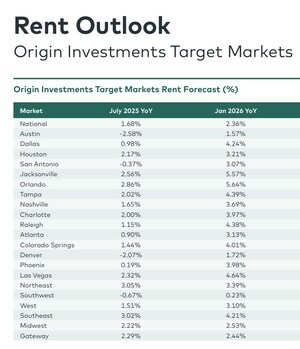CHICAGO, Dec. 10, 2024 /PRNewswire/ -- Origin Investments is predicting that multifamily rents and construction costs will move higher in 2025, banks' shifting "extend and pretend" strategies will force industry-wide losses, inflation will likely increase, and consumers will continue to choose renting versus buying homes because of a record pricing gap.
After two challenging years in the multifamily sector, tailwinds are appearing in the form of positive rent growth and demand. There are unknowns, such as the impact of potential Trump administration tariffs that could create inflationary pressures. However, despite the likelihood that interest rates won't drop low enough to stimulate transaction activity closer to peak 2021-'22 levels, the multifamily sector's strong fundamentals are reason for optimism.
"Our multifamily investment and operating perspectives go beyond a presidential term," said David Scherer, Co-CEO, Origin Investments and the author of the 2025 Predictions Report. "Despite uncertainties that may be present, we believe the rewards of multifamily investments outweigh the risks for investors looking to create wealth over time. I believe 2025 is the beginning of a significant bull cycle for multifamily rents, and there is strong investment potential in this sector."
Origin's 2025 multifamily real estate predictions are summarized below. Read the complete 2025 Predictions piece on Origin's website.
- Positive year-over-year rent growth accelerates in 2H2025 and continues in 2026.
A widening supply and demand imbalance for apartments in the U.S. will drive national annual year-over-year (YOY) Class A multifamily rent growth up 2.4% by January 2026, with gains in the West, Northeast and Southeast regions at or above historical 3% national averages.
Multilytics®, Origin's proprietary suite of machine learning models, predicts in its 2025 Rent Growth Forecast that YOY Class A rent growth will exceed 4.0% in Miami and Seattle; meet or exceed 3.0% in New York, Los Angeles and San Francisco, and exceed 2.5% in Chicago and San Diego. In markets such as Colorado Springs, Dallas, Jacksonville, Las Vegas, Orlando, Raleigh and Tampa, rent growth will range from 4.0% to 5.7%.
"We're seeing record delivery of new product from the unprecedented new development that broke ground three plus years ago," said David Scherer, co-CEO, Origin Investments. "With no new substantial wave of development coming in the near term, I see a world where rents continue escalating in the next one, two, three and maybe even four years." - Interest rates will hover between 3.75% and 4.75%.
Despite optimism that the Federal Reserve would lower rates several times in 2024, by Dec. 1 only two rate cuts had materialized. Scherer predicts substantial further cuts are unlikely, even though inflation has dipped closer to the Fed's stated goal of 2%.
"Interest rates will stay within the 100-basis point range from 3.75% to 4.75%," Scherer said, citing factors including stubborn inflation, steady and prolonged rent growth, and certain Trump policies that could make it harder to control inflation. "This will keep interest rates higher, and the market's behavior reflects that belief." - Realized losses in all real estate loans will accelerate over 2024.
It will become more difficult to "extend and pretend," the strategy used by banks over the past year to stretch the maturity of a loan and minimize delinquencies, with loans coming due in 2025. Distress could emerge with properties purchased at high prices in 2020-21. The U.S. market is set to absorb $2.0 trillion in debt maturities from 2024 through 2026, according to Newmark; more than 25% of that is potentially troubled. An increase in interest rates could exacerbate this. For multifamily, this is a financing issue and not one based on market fundamentals. - Debt funds will continue to be a major source of RE financing.
For the last 15-plus years, banks have become more stringent in their lending requirements, causing other financial sources like debt funds to aggressively pursue loan originations. By October 2024, debt funds represented 17% of originations of multifamily loans, according to Newmark—an all-time high. This paradigm is expected to continue, with debt funds taking a greater share of originations as banks' share continues to fall from a high point near 75%.
"The opportunity for debt funds will only increase as many multifamily owners whose originated loans from '21- and '22 loans are coming due will need higher loan amounts relative to current valuations, and more flexibility in structure," Scherer said. - The spread between homeownership and renting will moderate but stay at current levels.
The spread between homeownership and renting is at historically wide margins. According to Q3 2024 statistics from Newmark, the monthly difference totaled more than $1,200. That range will remain mostly unchanged given that positive rent growth is expected in 2026 and beyond, and the cost of homeownership won't change significantly with much change in interest rates.
"There will be a lot more renters until home prices fall," Scherer said. "Yet home prices aren't falling, which leads to the prediction that the record demand for multifamily rentals caused by unaffordability of for sale-housing will endure." - Multifamily sales activity will tick up but stay low relative to the 2021-22 peak.
Origin expects transaction volume will increase from 2023 and 2024 levels but remain below the peak of 2021 and 2022—provided interest rates stay within the predicted range. Factors leading to that include expected YOY rent growth, moderating supply levels and significant dry powder on the sidelines.
"Available capital, combined with the expectation of future rent growth due to lack of supply, will create pressure on pricing, which should result in a compression of cap rates," Scherer said. "Dry powder entering the market will be forced to accept those lower cap rates." - Construction costs will be impacted by tariffs.
implementing tariffs on China, Canada and Mexico will have a generally inflationary effect on the cost of construction materials. This won't seriously dent costs, at least in the short term, but it will provide an additional challenge to ongoing projects and construction starts. Beyond the impact of tariffs, Origin expects pricing to increase more in line with the 3% to 5% historical average. - Property insurance will normalize to an inflationary growth rate.
Origin believes there's strong potential for normalizing insurance costs in 2025 despite an inability to accurately predict climate factors like hurricanes, tornadoes, and tropical storms in the coming year. Further, new data from Marsh suggests that 2025 may provide some relief for property owners. Premiums could increase in 2025, but if they do, it's unlikely to be as steep as in prior years. - Affordability will become an increasing issue.
According to an annual National Association of Realtors survey, the median first-time home buyer age is 38, an all-time high. Younger professionals are forming households, but buying a house is out of reach, so they are renting. Next year, especially the last half, will be a transitional year for affordability, because wages have so far outpaced inflation, benefiting renters. As rents start to pick up, that will unwind, exacerbated by the lack of supply. This is not likely to change unless a recession occurs. - QOZ law will be extended.
With Donald Trump's return to office, it appears highly likely that the law creating Qualified Opportunity Zones will be extended. In his first term, the U.S. Tax Cuts and Jobs Act established opportunity zones as a means for investors who are eligible to eliminate capital gains taxes. As it now stands, QOZ investments can be made until June 30, 2027. A likely extension of the program would be good news for investors seeking tax-deferral benefits on eligible capital gains, and for QOZ fund managers like Origin.
Origin's predictions are based on its industry track record, a management and investment team with boots-on-the-ground experience across the U.S., and MultilyticsSM, its proprietary suite of machine-learning models.
About Origin Investments
Founded in 2007, Origin Investments is a private real estate manager that helps high-net-worth investors, family offices and registered investment advisors grow and preserve wealth by providing tax-efficient real estate solutions through private funds. We build, buy and finance multifamily real estate projects in fast-growing markets throughout the U.S. In 2023, we founded affiliate firm Origin Credit Advisers, an SEC-registered investment adviser that provides yield-focused multifamily debt investments for qualified purchasers. SEC registration does not constitute an endorsement by the Commission nor does it indicate that the adviser has attained a particular level of skill or ability. Through our Origin Exchange platform, introduced in 2024, investors can complete a 1031 exchange of their properties for professionally managed, institutional-quality assets. To learn more, visit www.origininvestments.com.
How Origin is disrupting multifamily real estate investing
Watch our new commercial
SOURCE Origin Investments

WANT YOUR COMPANY'S NEWS FEATURED ON PRNEWSWIRE.COM?
Newsrooms &
Influencers
Digital Media
Outlets
Journalists
Opted In






Share this article